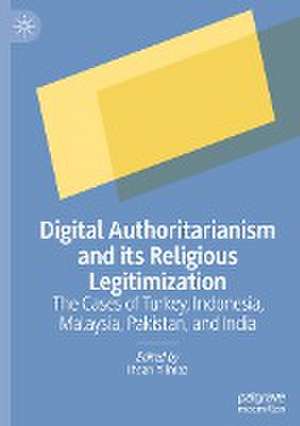Digital Authoritarianism and its Religious Legitimization: The Cases of Turkey, Indonesia, Malaysia, Pakistan, and India
Editat de Ihsan Yilmazen Limba Engleză Hardback – 23 aug 2023
In each of these states, governments, in an effort to prolong – or even make permanent – their rule, seek to eliminate freedom of expression on the internet, punish dissidents, and spread pro-state propaganda. At the same time, they instrumentalize religion to justify and legitimize digital authoritarianism. Governments in these five countries, to varying degrees and at times using different methods, censor the internet, but also use digital technology to generate public support for their policies, key political figures, and at times their worldview or ideology. They also, and again to varying degrees, use digital technology to demonize religious and ethnic minorities, opposition parties, and political dissidents. An understanding of these aspects would help scholars and the public understand both the technical and social aspects of digital authoritarianism in these five countries.
Preț: 725.43 lei
Preț vechi: 884.68 lei
-18% Nou
Puncte Express: 1088
Preț estimativ în valută:
138.82€ • 144.06$ • 116.04£
138.82€ • 144.06$ • 116.04£
Carte tipărită la comandă
Livrare economică 17-31 martie
Preluare comenzi: 021 569.72.76
Specificații
ISBN-13: 9789819935994
ISBN-10: 9819935997
Ilustrații: XV, 174 p. 7 illus.
Dimensiuni: 148 x 210 mm
Greutate: 0.38 kg
Ediția:1st ed. 2023
Editura: Springer Nature Singapore
Colecția Palgrave Macmillan
Locul publicării:Singapore, Singapore
ISBN-10: 9819935997
Ilustrații: XV, 174 p. 7 illus.
Dimensiuni: 148 x 210 mm
Greutate: 0.38 kg
Ediția:1st ed. 2023
Editura: Springer Nature Singapore
Colecția Palgrave Macmillan
Locul publicării:Singapore, Singapore
Cuprins
Chapter 1 - Digital Authoritarianism and Religion in Democratic Polities of the Global South.- Chapter 2 - Digital Authoritarianism and Religious Populism in Turkey.- Chapter 3 - Digital Authoritarianism and Religion in Indonesia.- Chapter 4 - Digital Authoritarianism and Religion in Malaysia.- Chapter 5 - Digital Governance and Religious Populism in Pakistan.- Chapter 6 - Hindu Nationalism and Digital Surveillance in India.- Chapter 7 - Digital Authoritarianism, Religion and Future of Democracy.
Notă biografică
Ihsan Yilmaz is Research Professor and Chair at the Alfred Deakin Institute for Citizenship and Globalisation, Deakin University, Melbourne, Australia. He is also a Non-Resident Senior Fellow at Oxford University’s Regent College and the European Center for Populism Studies, Brussels. Previously, he worked at the Universities of Oxford and London and has a strong track record of leading multi-site international research projects funded by the Australian Research Council, Victorian and Australian Governments, and Gerda Henkel Foundation. He has been working on authoritarianism, digital authoritarianism, populism, religion and politics with special emphasis on Turkey, Indonesia and Pakistan, and Muslim diasporas in the West.
Textul de pe ultima copertă
This book explores how digital authoritarianism operates in India, Pakistan, Turkey, Indonesia, and Malaysia, and how religion can be used to legitimize digital authoritarianism within democracies. In doing so, it explains how digital authoritarianism operates at various technological levels including sub-network level, proxy level, and user level, and elaborates on how governments seek to control cyberspace and social media.
In each of these states, governments, in an effort to prolong – or even make permanent – their rule, seek to eliminate freedom of expression on the internet, punish dissidents, and spread pro-state propaganda. At the same time, they instrumentalize religion to justify and legitimize digital authoritarianism. Governments in these five countries, to varying degrees and at times using different methods, censor the internet, but also use digital technology to generate public support for their policies, key political figures, and at times their worldview orideology. They also, and again to varying degrees, use digital technology to demonize religious and ethnic minorities, opposition parties, and political dissidents. An understanding of these aspects would help scholars and the public understand both the technical and social aspects of digital authoritarianism in these five countries.
Ihsan Yilmaz is Research Professor and Chair at the Alfred Deakin Institute for Citizenship and Globalisation, Deakin University, Melbourne, Australia. He is also a Non-Resident Senior Fellow at Oxford University’s Regent College and the European Center for Populism Studies, Brussels. Previously, he worked at the Universities of Oxford and London and has a strong track record of leading multi-site international research projects funded by the Australian Research Council, Victorian and Australian Governments, and Gerda Henkel Foundation. He has been working on authoritarianism, digital authoritarianism, populism, religion and politics with special emphasis on Turkey, Indonesia and Pakistan, and Muslim diasporas in the West.
In each of these states, governments, in an effort to prolong – or even make permanent – their rule, seek to eliminate freedom of expression on the internet, punish dissidents, and spread pro-state propaganda. At the same time, they instrumentalize religion to justify and legitimize digital authoritarianism. Governments in these five countries, to varying degrees and at times using different methods, censor the internet, but also use digital technology to generate public support for their policies, key political figures, and at times their worldview orideology. They also, and again to varying degrees, use digital technology to demonize religious and ethnic minorities, opposition parties, and political dissidents. An understanding of these aspects would help scholars and the public understand both the technical and social aspects of digital authoritarianism in these five countries.
Ihsan Yilmaz is Research Professor and Chair at the Alfred Deakin Institute for Citizenship and Globalisation, Deakin University, Melbourne, Australia. He is also a Non-Resident Senior Fellow at Oxford University’s Regent College and the European Center for Populism Studies, Brussels. Previously, he worked at the Universities of Oxford and London and has a strong track record of leading multi-site international research projects funded by the Australian Research Council, Victorian and Australian Governments, and Gerda Henkel Foundation. He has been working on authoritarianism, digital authoritarianism, populism, religion and politics with special emphasis on Turkey, Indonesia and Pakistan, and Muslim diasporas in the West.
Caracteristici
Explores how governments practice digital authoritarianism Includes research on the various technological levels; network level, sub-network level, proxy level, and user level Elaborates on how governments use religion to justify digital authoritarianism
